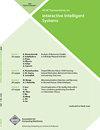当有偏见的人类遇到无偏见的人工智能:大学专业推荐的案例研究
IF 4.8
4区 计算机科学
Q2 COMPUTER SCIENCE, ARTIFICIAL INTELLIGENCE
引用次数: 0
摘要
目前,人们对公平的人工智能(AI)和机器学习(ML)研究的兴趣激增,这些研究旨在减轻人工智能算法中的歧视性偏见,例如性别,年龄和种族。虽然这一领域的大多数研究都集中在开发公平的人工智能算法上,但在这项工作中,我们研究了人类和公平的人工智能交互时出现的挑战。我们的研究结果表明,由于人类偏好与公平之间存在明显的冲突,一个公平的人工智能算法本身可能不足以在现实世界中达到预期的结果。以大学专业推荐为例,我们采用消除性别偏见的机器学习技术构建了一个公平的人工智能推荐系统。我们的离线评估表明,去偏见推荐器在不牺牲预测准确性的情况下做出了更公平的职业推荐。然而,一项针对200多名大学生的在线用户研究显示,参与者平均更喜欢原始的有偏见的系统,而不是去偏见的系统。具体来说,我们发现感知到的性别差异是接受推荐的决定性因素。换句话说,如果不解决人类的性别偏见,我们就不能完全解决人工智能推荐中的性别偏见问题。我们进行了一项后续调查,以进一步了解各种设计方案的有效性,这些方案可以帮助参与者克服自己的偏见。我们的研究结果表明,让公平的人工智能具有可解释性对于提高其在现实世界中的应用至关重要。本文章由计算机程序翻译,如有差异,请以英文原文为准。
When Biased Humans Meet Debiased AI: A Case Study in College Major Recommendation
Currently, there is a surge of interest in fair Artificial Intelligence (AI) and Machine Learning (ML) research which aims to mitigate discriminatory bias in AI algorithms, e.g., along lines of gender, age, and race. While most research in this domain focuses on developing fair AI algorithms, in this work, we examine the challenges which arise when humans and fair AI interact. Our results show that due to an apparent conflict between human preferences and fairness, a fair AI algorithm on its own may be insufficient to achieve its intended results in the real world. Using college major recommendation as a case study, we build a fair AI recommender by employing gender debiasing machine learning techniques. Our offline evaluation showed that the debiased recommender makes fairer career recommendations without sacrificing its accuracy in prediction. Nevertheless, an online user study of more than 200 college students revealed that participants on average prefer the original biased system over the debiased system. Specifically, we found that perceived gender disparity is a determining factor for the acceptance of a recommendation. In other words, we cannot fully address the gender bias issue in AI recommendations without addressing the gender bias in humans. We conducted a follow-up survey to gain additional insights into the effectiveness of various design options that can help participants to overcome their own biases. Our results suggest that making fair AI explainable is crucial for increasing its adoption in the real world.
求助全文
通过发布文献求助,成功后即可免费获取论文全文。
去求助
来源期刊

ACM Transactions on Interactive Intelligent Systems
Computer Science-Human-Computer Interaction
CiteScore
7.80
自引率
2.90%
发文量
38
期刊介绍:
The ACM Transactions on Interactive Intelligent Systems (TiiS) publishes papers on research concerning the design, realization, or evaluation of interactive systems that incorporate some form of machine intelligence. TIIS articles come from a wide range of research areas and communities. An article can take any of several complementary views of interactive intelligent systems, focusing on:
the intelligent technology,
the interaction of users with the system, or
both aspects at once.
 求助内容:
求助内容: 应助结果提醒方式:
应助结果提醒方式:


